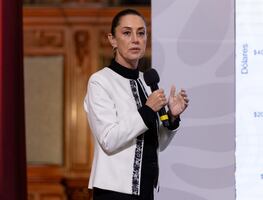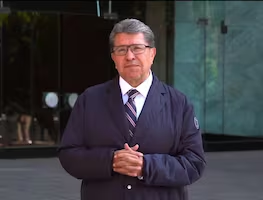Más Información

Inicia pago de la Pensión del Bienestar del bimestre enero-febrero; estas son las fechas de depósito

Violencia en el país evidencía colapso de estrategia de seguridad: PRI; insiste en cambiar el rumbo de combate

Defensa toma protesta al general Maximiliano Cruz Ramos; fungirá como Inspector y Contralor General de División de Estado Mayor

Sheinbaum destaca reducción de homicidios dolosos en último mes de 2024; “Confiamos en nuestra estrategia”, dice

Sheinbaum no hablará de seguridad en reunión con presidentes municipales; revisarán tema de infraestructura

Monreal reitera apoyo a Sheinbaum para este 2025; “la conducción del país está en buenas manos”, dice
In a sweeping document on family life that opened a door to divorced and civilly remarried Catholics, Pope Francis insisted Friday that church doctrine cannot be the final word in answering tricky moral questions and that Catholics must be guided by their own informed consciences.
Francis didn't create a churchwide admission to Communion for divorced and civilly remarried Catholics as some progressives had wanted. But in the document "The Joy of Love," he suggested that bishops and priests could do so on a case-by-case basis in what could become a significant development in church practice.
The pope also strongly upheld the church's opposition to same-sex marriage.
The 256-page document, two years in the making and the product of an unprecedented canvassing of ordinary Catholics and senior churchmen, is a plea from Francis' heart for the church to stop hectoring Catholics about how to live their lives and instead find the redeeming value in their imperfect relationships.
"I understand those who prefer a more rigorous pastoral care which leaves no room for confusion," he wrote. "But I sincerely believe that Jesus wants a church attentive to the goodness which the Holy Spirit sows in the midst of human weakness."
The document is cleverly worded: Francis selectively cited his predecessors, making clear he is working within their tradition but omitting the sometimes harsh, definitive language that is an anathema to his mercy over moral priorities. He cited himself repeatedly, making some of his most significant points in strategically placed footnotes, rather than the text itself.
"It's the classic case of an organic development of doctrine," said Cardinal Christoph Schoenborn, the archbishop of Vienna who presented the document at a Vatican news conference. "There is innovation and continuity. There are true novelties in this document, but no ruptures."
Gay Catholics were highly critical, saying Francis had failed them. The document offered nothing significant beyond existing church teaching that gays are not to be discriminated against and are to be welcomed into the church with respect and dignity. It repeated the church's position that same-sex unions can in no way be equivalent to marriage between a man and woman.
"He has ignored submissions and appeals by lesbian, gay, bisexual and transgender Catholics," said British gay rights advocate Peter Tatchell. "Gentler words do not assuage Vatican opposition to gay equality."
On thorny issues such as contraception, Francis stressed that a couple's individual conscience educated in church teaching - and not just dogmatic rules imposed on them across the board from above - must guide their decisions and the church's pastoral practice.
"We have been called to form consciences, not to replace them," he said.



